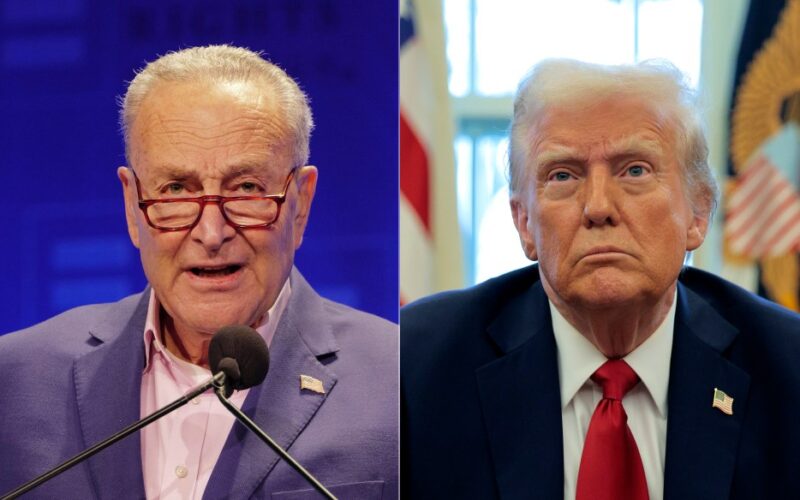Amid an emerging trade war over the weekend, Sen. Chuck Schumer slammed President Trump’s decision to impose stiff tariffs on Canada, Mexico and China.
“The President is not just randomly slapping on tariffs, he’s slapping consumers right where it hurts — their wallets,” Schumer (D-N.Y.) said Sunday. “To make matters worse, it’s cities like New York, and metro areas like Long Island who will see higher costs first and often longer.”
Trump signed an executive order Saturday that imposed 25% import tariffs on products from Canada, Mexico and China beginning Tuesday. Canadian and Mexican leaders promised to immediately respond.
Economic analysts have estimated the tariffs will cost each household about $1,170, a figure that Schumer cited Sunday in a press conference. The new 25% tariffs “make 100% no sense,” the senator said.
On the campaign trail, Trump made tariffs a major part of his economic platform, promising to impose tariffs as punishment for other policies. He said they would be a negotiating tactic to prevent illegal immigration and fentanyl smuggling — but he imposed the taxes just two weeks into his second term.
“It was Donald Trump who campaigned on lowering costs, and now it is Donald Trump who will raise them, and expects consumers to just be OK with that,” Schumer said. “So, here we are now, in a trade war with Mexico and Canada. For the American people now, it will be a war between prices and their paychecks.”

Both Canada and Mexico promised quick responses to the tariffs. Canadian Prime Minister Justin Trudeau announced matching 25% tariffs on U.S. goods.
“The actions taken today by the White House split us apart instead of bringing us together,” Trudeau said.
Mexican President Claudia Sheinbaum similarly slammed Trump’s action and announced Mexico’s own plans for retaliation.
Trump has insisted the tariffs will work out positively for the U.S., calling them necessary “to protect Americans.” But economists warned that if the tariffs are allowed to persist, they could upend the global economy and isolate the U.S., driving up prices.
“It doesn’t make much economic sense,’’ said William Reinsch, senior adviser at the Center for Strategic and International Studies and a former U.S. trade official. “Historically, most of our tariffs on raw materials have been low because we want to get cheaper materials so our manufacturers will be competitive.”
The Canadian tariff policy includes a small exception for oil, natural gas and electricity, which will be taxed at 10% instead of the 25% on other goods. The tariffs represent a massive shift in U.S. trade policy with Canada and Mexico that has been focused on free trade since the early 1990s.
“No matter which way you slice it: Costs are going to climb for consumers and if you’re in New York City or on Long Island, you’ll feel it first,” Schumer said. “I will work with my colleagues to undo this mess, get costs down, and get these billionaires out of the way.”
With News Wire Services








